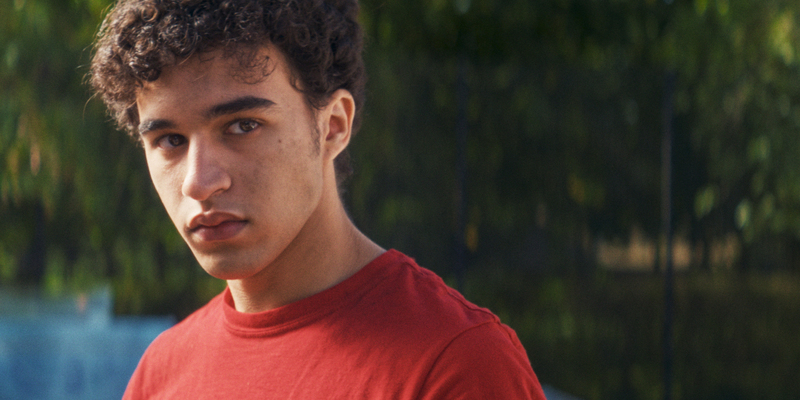
Review by
Benjamin Poole
Directed by: Zeno Graton
Starring: Khalil Ben Gharbia, Julien De Saint Jean, Eye Haïdara, Jonathan
Couzinié

Who doesn’t love a prison film? You do. You keep on voting
The Shawshank Redemption the top film ever on IMDB, after
all. If you're making small talk with someone and it transpires that they
write for a film site you say with authority, "I'll tell you a good film,
The Shawshank Redemption, now that's a good film" and you wistfully nod at me.
McVicar, Papillion, Alien 3: you just cannot get enough of films about men banged up in the nick
(and you probably watch the telly shows which feature women, via a
curiously gender split media dichotomy, in similar straits such as
OITNB, Prisoner: Cell Block H, Tenko, too). I can see why. I love them, as well. Even an objectively bad
prison film is better than an objectively average non-prison film (the two
genres), because at least the former takes place in a prison. The
concentrated arena of human drama, a darkening grey chroma of morality,
the ersatz hierarchies. The slang, the mad little rules, the phones up the
arse. Love it.

Based on this acid test, you'll enjoy The Lost Boys (not
that one, etc), Zeno Graton's (with script duties shared with
Clara Bourreau and Maarten Loix) Belgian borstal drama, too.
A glossier contrast to other, grittier British youth custody flicks,
The Lost Boys centres on Joe (Khalil Ben Gharbia, our
old friend from
Peter Von Kant. Scum? YUM, more like) doing a lump of bird in an ideologically liberal
facility for what look like ex-male models who chose the wrong catwalk in
life... Joe has been sent down for crimes which are linked to his
disadvantaged social status, "stunts" which are suggested as more a cry of
recognition than anything else. His long-suffering supervisor Sophie (a
really good Eye Haïdara) implores him to write a letter of apology
to the judge, as parole is a possibility by the end of the month. Problem
is, though, that Joe is a kid, and it is really difficult to get teenagers
(24 year old Gharbia is playing, slightly unconvincingly, 17) to envision
the bigger picture. Instead, in the film's opening moments Joe witters on
about fish trapped under the ice - an awkwardly on the nose metaphor which
I assume was scripted to efficiently communicate Joe's jejune nature. Does
The Lost Boys imply that prison, for all its lack of
freedoms and dignity, at least provides somewhere for this, how you say,
garçon perdu to find a sense of belonging?

Prob best not to let a frustrated Daily Mail reader near this one, though.
There's the food for one thing. Graton regularly frames sequences around
communal dining periods, which feature very appetising nosh - an early
lunch of pasta pointedly has the big steaming pot placed upon the table,
so the young lags can help themselves to seconds. Oliver Twist could
never. The wardens are also decent and patient, attempting to engage their
youthful charges in creative activities and sports in order to develop
esteem and focus energy - at one point the kids are taught to make box
cameras! Only an idiot would say a correctional facility is like a holiday
camp, but The Lost Boys does depict a detention centre which
is utopian in its outlooks and focussed on restoration rather than
deprivation. It is a refreshing representation, one which essays the
complications of a prison system and its denizens with far more complexity
than the usual shivs and showers.
The line, however, is drawn at physical contact and relationships, which
restricts (or, looking on the bright side, adds an extra illicit thrill)
to Joe's burgeoning relationship with William (Julien De Saint Jean), a bad boy gang member with cheekbones whom he has fallen in desperate
love with. Conveniently, the two are placed in cells next to each other
and whisper communications at night through a wall which Roland Barthes
would refer to as a symbolic code. As part of the central conflict,
The Lost Boys positions Joe and William's love as
constrained by the prison system, which has draconically imposed partition
upon the two. But the thing is that's true of all institutions, really. A
sixth form college doesn't have a special room where students can go off
and have a cuddle, for instance. Also, these lads don't do too badly,
either, managing a good few knee tremblers over their 20-day fling - even
one in the open air during a badly chaperoned physical exercise activity.
Can you, with a whopping 94% chance of you not being in prison, boast the
same?!

Filmed in oppressive medium shots and close ups, with an overwhelming
recurrence of the dehumanising orange uniforms the boys wear, we
experience the airless intimacy of prison, the pressing closeness of it
all (the lads in orange reminded me of the great kid's film
Holes - now there’s a borstal film!). However, the conflict
of Joe and William's relationship is fairly quotidian and falls into the
Sad Gay trope by default rather than design. While their relationship is
not endorsed by the screws, it is at least accepted by them and the other
inmates, and also they've got the ever-present potential for loving sex;
one up on their colleagues, surely. A more interesting aspect of the
affair concerns Joe's recidivism, and how far it is inspired by his
apparent love for William. Love is only ostensible here because, let's
face it, they are both kids, and their relationship is based on the
intensified circumstances of their context; a context which Joe, perhaps
blinded by the first true affection he has experienced, seems tragically
institutionalised by. The Lost Boys intimates towards this
narrative thread but doesn't really explore the short-term nature of
youthful romance, wherein you go down for a brief time, but which rarely
leads to a life sentence.

The Lost Boys is on UK/ROI VOD from February 19th.

